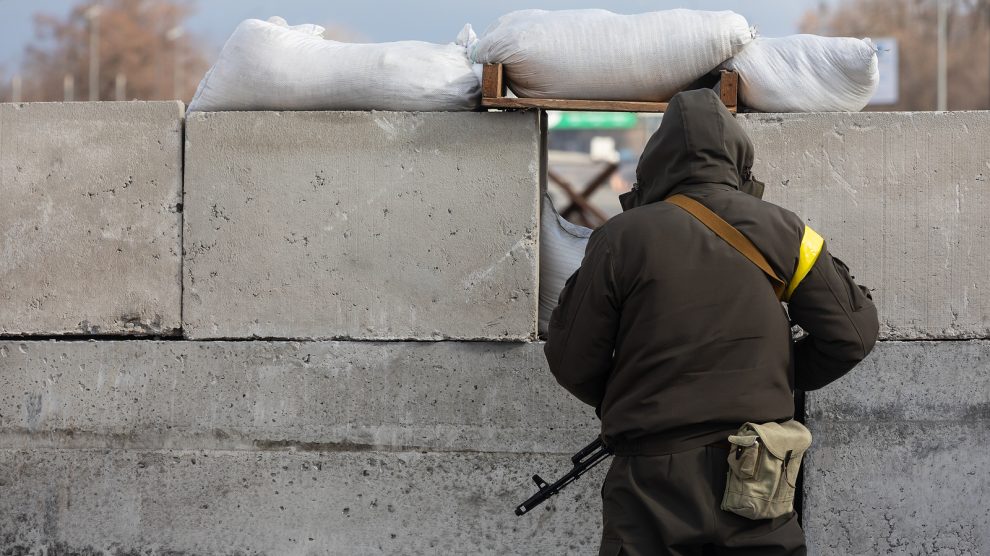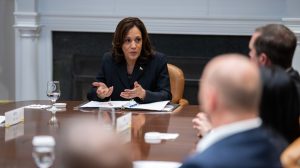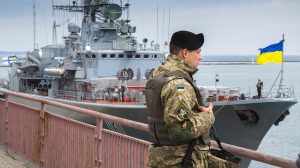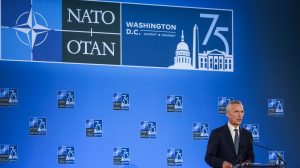Catch up quickly with the stories from Central and Eastern Europe that matter.
Russia’s war on Ukraine
Ukrainian President Volodymyr Zelensky made a passionate plea to leaders at the World Economic Forum in Davos on Tuesday, urging them not to allow Russia’s war in Ukraine to become “frozen.”
Speaking in person at the conference for the first time since Russia launched its full-scale invasion nearly two years ago, Zelensky said Ukraine had defied expectations in repelling Moscow’s forces for so long and that its allies “know what’s needed” to allow “progress on the ground,” which has been in short supply for many months.
At the start of Zelensky’s address, which he delivered in English, he said he understood many in the audience would be asking difficult questions: “When will the war end? Is the third world war possible? Is it time to negotiate with Putin?”
Zelensky warned “any frozen conflict will eventually reignite,” pointing to how Russia renewed its aggression after “attempts to freeze the war in the Donbas” after 2014. Instead, he said Ukraine needed to be provided with more weapons to bring about a “just and stable” peace.
Also speaking in Davos on Tuesday, European Commission president Ursula von der Leyen meanwhile said Ukraine’s allies need to guarantee stable backing for Kyiv as questions swirl over future support from the United States and EU.
“Ukraine can prevail in this war. But we must continue to empower their resistance,” the head of the European Union’s executive arm said.
“Ukrainians need predictable financing throughout 2024 and beyond. They need a sufficient and sustained supply of weapons to defend Ukraine and regain its rightful territory.”
EU leaders will hold a summit on February 1 to try to overcome a block from Hungary on providing 50 billion euros in financial aid to Ukraine over the next four years.
The government in Kyiv desperately needs the funds to prop up its economy and keep services working as Russia’s all-out war heads towards its second anniversary.
Kyiv and Brussels are developing safeguards to make it impossible in the future to block the land borders of Ukraine and the European Union, Ukrainian deputy infrastructure minister Serhiy Derkach said on Wednesday.
Weeks of blockades by Polish drivers at border crossings have caused significant damage to Ukraine and it was only on Tuesday that Warsaw and Kyiv managed to unblock them.
“We are now working with the European Commission to make some safeguards so that borders and roads to border crossings cannot be blocked,” Derkach told national television.
Polish hauliers had been protesting over what they said was unfair competition from their Ukrainian counterparts, demanding that the EU reinstate a system in which Ukrainian companies need permits to operate in the bloc and the same for European truckers entering Ukraine.
Ukraine has been forced to significantly increase trade through its land borders as its previously main trade routes were blocked after the Russian invasion in February 2022.
Other news from the region
Poland’s former deputy foreign minister has been arrested in connection with a visa fraud scandal that undermined the previous right-wing administration and helped Donald Tusk’s coalition win October’s election. The detention of Piotr Wawrzyk, announced on Wednesday by the country’s central anti-corruption bureau, will deepen the rift between new prime minister Tusk and opposition politicians from the former Law and Justice (PiS) administration who claim that Tusk has launched a political witch-hunt against PiS.
Poland plans to set an end date for coal-fuelled power, the country’s Secretary of State for Climate Urszula Zielińska said on Monday, marking a shift from the previous government’s stance on climate change. “Only with an end date we can plan and only with an end date industry can plan, people can plan. So yes, absolutely, we will be looking to set an end date,” she told reporters in Brussels. Poland gets around 70 per cent of its power from coal, the most CO2-emitting fossil fuel, although it has increased wind and solar generation in recent years.
More than 20 senior European foreign affairs politicians have called on Commission President Ursula von der Leyen to investigate allegations of fraud in December’s election in Serbia. “We call on the EU to conduct an independent investigation of all reported election irregularities and claims of fraud,” the politicians wrote in letter seen by Politico. Serbia’s illiberal President Aleksandar Vučić tightened his grip on power by claiming victory in the December ballot, sending tens of thousands of people into the streets of Belgrade to protest what they claimed was a stolen election.
Lithuania broke European human rights laws by allowing the CIA to subject an alleged 9/11 suspect to “inhuman treatment” in a secret interrogation centre in the Baltic country, the European Court of Human rights ruled this week. The court said Mustafa Ahmed Adam al-Hawsawi raised multiple complaints of torture, ill treatment and unacknowledged detention in 2005-2006 when he was held at a secret facility in Lithuania run by the CIA. Hawsawi is now held in Guantánamo Bay on suspicion of being a facilitator and financial manager of al-Qaida.
The organising committee for the COP29 global climate change summit in Azerbaijan in December comprises 28 men and no women, the president of Azerbaijan, Ilham Aliyev, announced this week. The decision was called “a regressive step” by the She Changes Climate campaign group, which said “climate change affects the whole world, not half of it”. In contrast, 63 per cent of the members of the organising committee for the COP28 climate summit, held in the United Arab Emirates last month, were women.
Authorities in Moldova said on Monday they were having difficulty coping with a steep increase in applications for citizenship from Russians. “In view of a surge in requests for Moldovan citizenship, the agency is asking the government to extend the time limit for examining applications to six months,” instead of the current term of 20 days, said a government agency which deals with citizenship and passports. “The geopolitical situation in the region created by Russia’s war against Ukraine has generated an increase in the number of persons seeking to acquire Moldovan citizenship.”
Estonia will stop funding Russian-language education, the Estonian parliament announced this week, citing Estonian Prime Minister Kaja Kallas. The Estonian government reportedly intends to switch to a “unified Estonian-language education” system, meaning it will no longer dedicate funds toward supporting Russian-language schools. “It’s written in the Constitution: the state language of Estonia is Estonian, and everyone has the right to study in the Estonian language,” Kallas said, adding that Estonia has no desire to “Russify” the state’s children.
The story of a man jailed for wearing a tie has become the first Armenian film to make it onto the Oscar’s shortlist, in the international feature category. “Most of the films made about Armenia tend to revolve around the genocide. I wanted to make a film that would be enjoyable for Armenians and something that could relate to non-Armenians,” said US actor Michael A. Goorjian, who directed and wrote the film, in which he also stars. Shot in Armenia, Amerikatsi (American in Armenian) is also an attempt to rebuild the country’s film industry, which lost its way after independence from the Soviet Union in 1991.
Unlike many news and information platforms, Emerging Europe is free to read, and always will be. There is no paywall here. We are independent, not affiliated with nor representing any political party or business organisation. We want the very best for emerging Europe, nothing more, nothing less. Your support will help us continue to spread the word about this amazing region.
You can contribute here. Thank you.







Add Comment